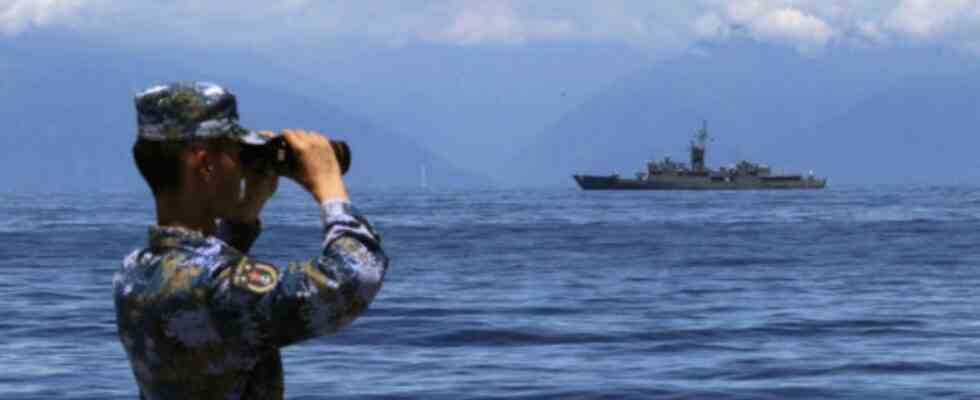Taiwan on Saturday accused the Chinese army of simulating an attack on the island, with China stepping up its retaliation after the visit to Taipei of the number three American, Nancy Pelosi.
China thus announced on Friday the “suspension” of judicial and anti-drug cooperation with the United States, but also of bilateral dialogue on climate change – among other areas. On the military front, China continues this Saturday its most important exercises ever organized around Taiwan. They must last until Sunday noon (6 a.m. in Paris) and are presented as training for a “blockade” of the island.
” Day and night “
Taiwanese authorities have announced that they have detected “multiple” Chinese planes and ships in the Taiwan Strait, between the island and mainland China. “Some of them have crossed the median line”, which bisects the strait, and “are considered to be carrying out a simulation of an attack against the main island of Taiwan”, the Taiwanese Ministry of Defense said on Saturday. . Drawn unilaterally by the United States during the Cold War, this line has never been recognized by Beijing.
The Chinese army announced that it had deployed a large number of fighters, bombers and destroyers the day before to participate in these maneuvers carried out “day and night”, she said. A warning sent to the Taiwanese president, from an independence party, and to the United States, accused by Beijing of having “betrayed” their word by strengthening their relations with the Taiwanese authorities in recent years.
The Chinese army published this Saturday the photo of what it presents as a Taiwanese navy vessel, photographed near the coast of the island from the deck of a Chinese military boat located only a few hundred meters away. She also posted the video of a Chinese air force pilot filming, from his cockpit, the coast and the mountains of Taiwan, images supposed to demonstrate Beijing’s ability to approach very close to the island.
Ambassador summoned
China has also announced new “real-fire” maneuvers from this Saturday until August 15 in a small maritime area very close to the Chinese port of Lianyungang, on the edge of the Yellow Sea which separates China from the Korean peninsula. According to Chinese state television CCTV, missiles flew over Taiwan this week during exercises around the island – which would be a first.
Taipei authorities denounced the actions of their “malicious neighbor”. The scale of the exercises has also drawn condemnation from the G7 countries, the United States and some of their allies. The White House has summoned the Chinese ambassador, Qin Gang, to castigate behavior deemed “irresponsible”.
Beijing’s decision to suspend climate dialogue with Washington has drawn another wave of criticism. “It’s obviously worrying,” according to Alden Meyer, an analyst at the E3G think tank, specializing in climate change. “It is impossible to tackle the climate emergency if the two main economies and the two biggest emitters do not act, and it is always better that they do so in collaboration. »
“Irresponsible”
The spokesman for the American executive for national security affairs, John Kirby, castigated him on Friday for a “fundamentally irresponsible” decision. “China is not just punishing the United States, it is punishing the whole world,” he added. UN Secretary General Antonio Guterres expressed his dismay. For him, “it is impossible to solve the most pressing problems in the world without effective dialogue and cooperation between the two countries”, said his spokesman.
With China-Taiwan tensions at their highest in nearly 30 years and the risk of military conflict, the deterioration in Beijing-Washington relations could be long-lasting, experts note. “The US-China relationship is currently in very bad shape,” said Bonnie Glaser, China specialist at the German Marshall Fund of the United States research center in Washington.
She cites as “particularly worrying” the suspension of cooperation agreements crucial for the stability of the region, such as that on maritime military cooperation aimed precisely at preserving escalation. Most analysts agree, however, that despite these military exercises, Beijing does not want an armed confrontation for the time being.

